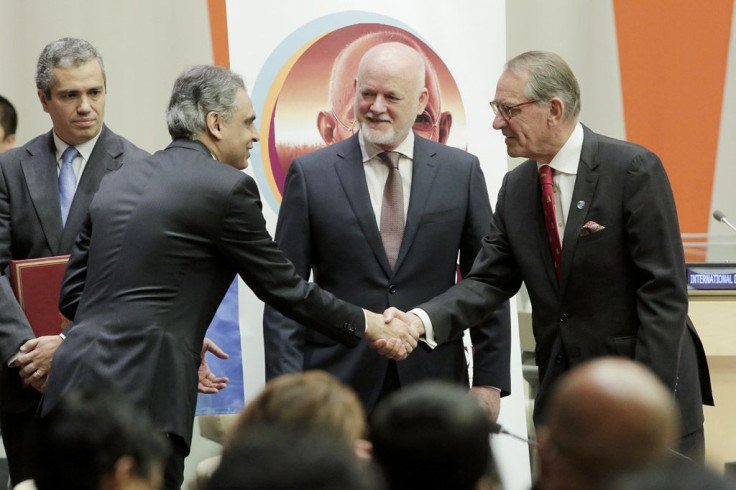India Ratifies Paris Climate Agreement, Bringing It Closer To Enforcement

India on Sunday officially ratified the Paris Agreement on climate change, bringing the treaty much closer to coming into force. The move by India — made on Oct. 2 to coincide with the birthday of Mahatma Gandhi — means 62 countries, together responsible for almost 52 percent of the world’s greenhouse gas (GHG) emissions, have now ratified the accord.
The Paris Agreement needs a minimum of 55 countries that collectively contribute at least 55 percent of GHG emissions to enter into force.
India’s Permanent Representative to the United Nations Syed Akbaruddin handed over the country’s instrument of ratification to the U.N.’s Office of Legal Affairs.
India's PR, @AkbaruddinIndia hands over instrument of ratification of #ParisAgreement to the Office of Legal Affairs, @UN #climatechange pic.twitter.com/1Yw9CLhNfM
— Indian Diplomacy (@IndianDiplomacy) October 2, 2016
With India’s announcement Sunday, the treaty was “tantalizingly” close to being enforced, U.N. General Assembly President Peter Thomson said at the event.
Last month, India’s Prime Minister Narendra Modi said the treaty’s ratification was the best possible tribute to Mahatma Gandhi who was known to have lived an austere life in his later years.
Under benign gaze of the Mahatma.
— Syed Akbaruddin (@AkbaruddinIndia) October 3, 2016
India fulfills PM @narendramodi's commitment to deposit Paris Agreement ratification @un on 2 October. pic.twitter.com/8lBiZkBWWc
U.S. President Barack Obama also invoked Gandhi in welcoming India’s move.
Gandhiji believed in a world worthy of our children. In joining the Paris Agreement, @narendramodi & the Indian people carry on that legacy.
— President Obama (@POTUS44) October 2, 2016
In its voluntary action plan, India has committed to generating 40 percent of its total electricity from non-fossil fuel-based sources by 2030. There is also a provision to reduce its emissions intensity per unit of the country’s gross domestic product by 33 to 35 percent by 2030, compared to 2005 levels.
However, referring to the upcoming COP22 meeting in Morocco in November, Chandra Bhushan, deputy director general of Indian think tank the Centre for Science and Environment, said: "The rule book for implementation of the Paris Agreement is yet to [be] negotiated. India should play an important role in issues of adaptation, finance and loss and damage in the upcoming climate talks in Marrakech as these issues are important for the poor and vulnerable population of the country.”
India accounts for 4.1 percent of global GHG emissions. The world’s two largest polluters, China and the United States, both ratified the Paris Agreement on Sept. 3.
A statement issued by the office of U.N. Secretary-General Ban Ki-moon after India’s ratification said: “The Secretary-General calls on all Parties to accelerate their domestic procedures in order to join the agreement as soon as possible this year. Action on climate change is crucial for achieving the Sustainable Development Goals (SDGs) and creating a more prosperous, equitable and livable future for all people.”
© Copyright IBTimes 2024. All rights reserved.




















